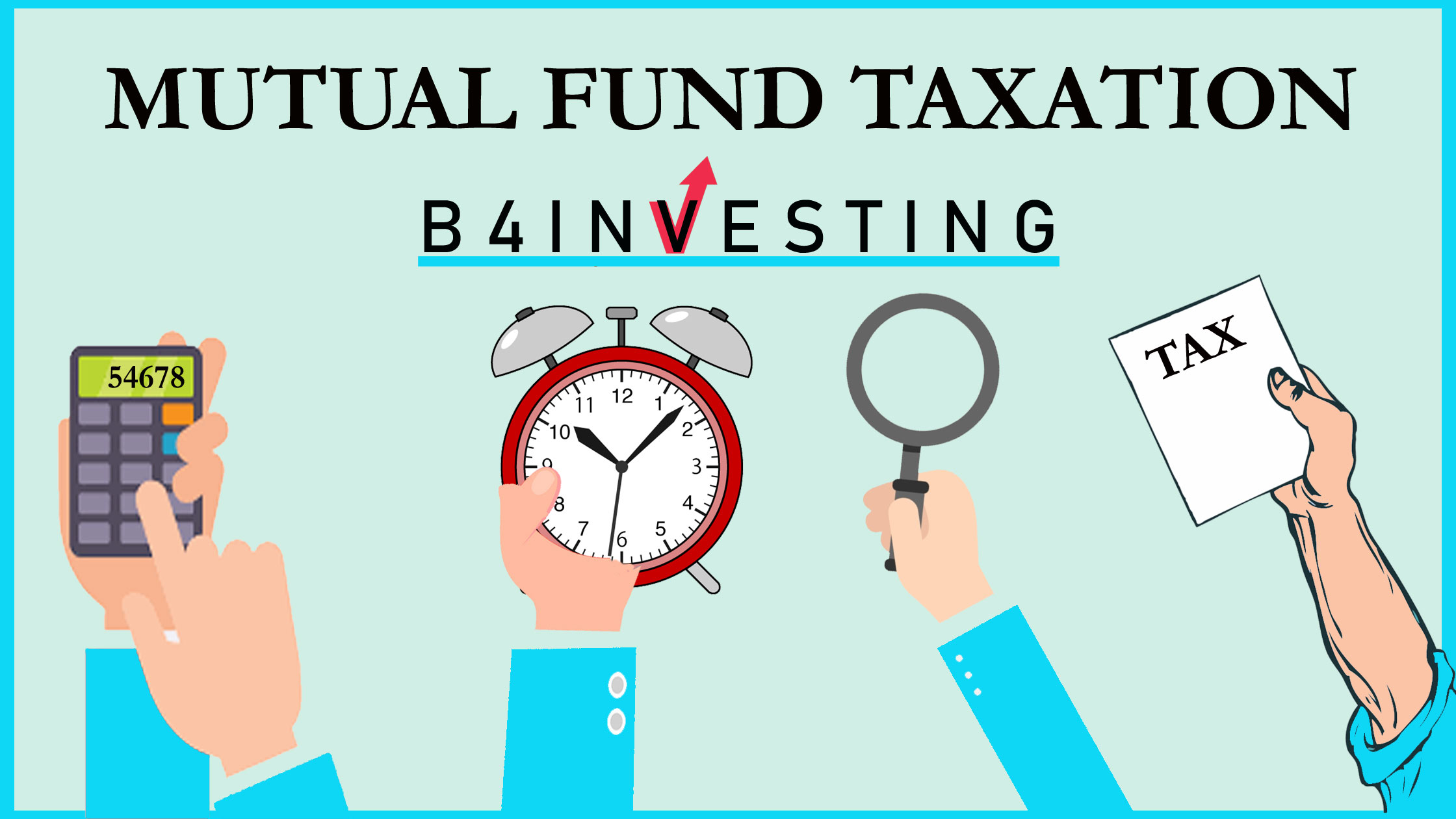
All about Mutual Fund Taxation
Mutual fund is one of the most tax efficient type of investment option as compared to other options present in the market. But, there are various layers to it. Mutual funds can provide earnings in two forms; Capital Gains and Dividends.
We at “b4Investing” are helping you to understand the taxation on mutual funds better so that you can make a very effective use of the investment options for your benefit. Let us understand the detailed aspect of mutual fund taxation in India.
Is it Equity or Non Equity?
The crux to taxation of mutual fund depends upon the fact that the fund in context is an equity fund or a non-equity fund. According to the Income Tax Act, “A mutual fund scheme is classified as an equity fund if the proportion of holdings in equity is above 65%. The large cap funds, mid cap funds, index funds, sector funds and arbitrage funds will classify under equity funds for taxation purposes. All the funds that do not fall on the category are non-equity funds.” This distinction has a major impact on the taxation of dividends and capital gains.
Taxation on Dividends
Dividends are the share of profit received by the investor. Dividends are taxed differently based on the fact that it is an equity fund or a non equity fund.
- In the case of equity funds, the dividends were entirely free earlier. Previously, dividends were tax-free in the hands of investors as the companies paid Dividend Distribution Tax (DDT) before sharing their profits with the investors. At those times the dividends received from domestic companies of up-to Rs.10 lakh per year were tax-free. Any dividend in excess of that attracted a tax of 10%
However, as per the amendments made in the Union Budget 2020, dividends received by the investors are added to their taxable income and are taxed at their respective income tax slab. The DDT is now @ 11.648% (10% DDT+12% surcharge+4% cess). This reduces the amount of dividend received.
- In the case of non-equity funds, the DDT is much steeper. Dividends paid out by debt funds, liquid funds and income funds are subject to DDT @ 29.12%(25%DDT+ 12% surcharge + 4% cess). This is at par with the peak income tax rate.
Hence it is advisable to go for growth plan and make systematic withdrawal plan (SWP) and going for a dividend plan of debt funds.
Taxation on Capital Gains
Capital gains are profits made when the selling price is higher than the cost price of the unit of fund invested by an investor. The taxation rate of capital gains on mutual fund depends on the holding period as well as the type of fund. The holding period is the time between the purchase and sale of the unit of the fund.
Short-term capital gains vs. Long-term capital gains:
- Equity funds: Less than 12 months vs. 12 months or more.
- Debt funds: Less than 36 months vs. 36 months or more.
The short-term and long-term capital gains offered by mutual funds are taxed at different rates.
Taxation on capital gains on Equity Funds
Mutual funds with 65% equity exposure are Equity Funds. In short-term capital gains, the Short-Term Capital Gain (STCG) Tax rate is 15.6% (15%+Cess) irrespective of the income tax bracket. In long-term capital gains, the gains of up to Rs.1 lakh a year are tax-exempt. Any gains exceeding this limit calls for Long-Term Capital Gain Tax (LTGC) Tax at the rate of 10%. Even if you hold the equity fund for 10 years, there is no benefit of indexation available.
(Indexation refers to recalculating the purchase price, after adjusting for inflation index.)
Taxation on capital gains on Debt Funds
Mutual funds with 65% debt exposure are Debt Funds. STCG is taxed at your peak tax rate applicable since it is added to your other income. LTCG are taxed at 20% flat but with the benefit of indexation. One can also plan purchases in late March and sale in early April to get benefits of dual indexation.
Taxation on capital gains on Hybrid Funds
The rate of taxation on capital gains on hybrid funds is dependent on the equity exposure of the portfolio. If the equity exposure exceeds 65%, the fund scheme is taxed like an equity funds, if not then rules of taxation of debt funds apply. Hence, it is very important to know the equity exposure of hybrid funds.
Taxation on capital gains on Systematic Investment Plans(SIPs)
Investor invests small amount periodically which can be weekly, monthly, quarterly, bi-annually or annually in mutual fund through SIP. The redemption of these units is processed on a first-in-first-out basis. The units purchased first if held for 13 months then you realize long-term capital gains and taxed accordingly and if a unit is help for 2 months then STGC Tax apply @15% with applicable cess and surcharge.
Securities Transaction Tax (STT)
Apart from tax on dividends and capital gains, there is another tax levied by the government of 0.001% STT when you buy or sell mutual fund of equity funds or hybrid equity-oriented fund. There is no STT on the sale of debt funds.

Tax rebate on ELSS funds
A different kind of equity-oriented funds that offer tax exemption under Section80C subject to lock-in period of 3 months. Withdrawing funds during these 3 year is not permissible. Section 80C also offers upper limit blanket of Rs.1.50 lakhs. For eg: if you are in the 30% tax bracket and if you contribute to ELSS the you get a 30% tax break on this contribution. When you invest Rs.1000 you are effectively investing only Rs.700, here you see the benefits of ELSS due to the tax break.
The Bottom Line
“The hardest thing in the world to understand is the Income Tax”
-Albert Einstein.
Now you know the taxes assoiated with mutual funds you can make an informed decision.
Be Educated!
Be Careful!!
But, Be Bold!!!
Happy Investing!!!

